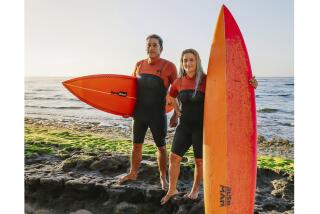Battle for sharks off Marthaâs Vineyard
Reporting from Oak Bluffs, Mass. â
This was the moment Matt Connelly had waited years for: the sudden yank on the line, the violent tug that dragged him to the edge of the boat and nearly into the cold Atlantic.
After 90 exhausting minutes, the battle was over.
Connelly and his crew mates peered down at the massive fish beside their 29-foot boat, Rogue Angel. They pulled out a tape measure to make sure their eyes werenât playing tricks on them. Finally, convinced the fish was big enough to haul in, they gaffed it, guessing its weight at 275 pounds.
PHOTOS: Debunking sharksâ bad reputation
They were off by more than 50 pounds. The fish weighed 334 pounds when it was hoisted onto the scales on Day One of the Monster Shark Tournament, which depending on your point of view is a premier sportfishing contest, a bloody assault on an elegant species, or a chance for scientists to get a close-up look at some of the oceanâs biggest predators.
âControversy sells,â said Steven James, the tournament organizer, dismissing the opposition to the 26-year-old grandaddy of shark tournaments.
âAre they hurting me? No, theyâre not,â James said of his critics as he drove through the quiet streets of Marthaâs Vineyard before dawn, delivering 40-pound buckets of chum and boxes of bait to competitors.
By the time he finished, hundreds of anglers would be heading out to sea, hoping to bring in the biggest catch of the two-day tournament and claim tens of thousands of dollars in cash and prizes.
It is one of dozens of shark-fishing contests held each year in the United States. In recent years, some have bowed to pressure from animal rights and environmental groups to require competitors to release what they catch. But the Monster event goes on as is, its popularity fueled in part by a spate of shark-human encounters in the area that evoked images of âJaws,â the 1975 blockbuster film that was filmed nearby.
âThe very most fundamental human, primal fear is the thought that you might be eaten alive,â said James, who runs a charter fishing boat business south of Boston and is on a National Marine Fisheries Service advisory panel on migratory species.
He ticked off some of the state and federal regulations that govern the tournament: Sharks must meet minimum size limits or be released. Some species, such as great whites, are off-limits. Anglers must fight the fish one-on-one, without help from others on a boat â a battle than can last hours.
âItâs an athletic endeavor that brings people to their knees,â said James, who is also president of the Boston Big Game Fishing Club, which puts on the for-profit tournament.
The Humane Society and other groups say such tournaments are depleting the oceans of sharks and also fuel the idea that sharks are eating-machines rather than a vital species deserving of protection.
âThese tournaments make a big deal of stringing the shark up, opening its mouth and showing its teeth. Itâs reinforcing the idea that these are bloodthirsty predators and that the only good shark is a dead shark,â said Sharon Young, the marine issues field director for the Humane Society.
She noted that participation in the Monster tournament was down: This year, 102 boats were registered, less than half as many as six years ago.
âI think people are starting to see sharks as something besides a dangerous animal,â Young said.
But thereâs no question that James and the Monster Shark Tournament have the upper hand in Oak Bluffs, whose leaders have resisted demands to oust the event.
Across the picturesque resort of winding roads, colorful gingerbread cottages and bars lining the lively wharf, shark mania abounds. Crowded shops sell shark T-shirts, shark baseball caps, fuzzy shark toys and shark mugs. âNo vacancyâ signs hang outside every hotel and inn. A giant sharkâs mouth opens to form the mail slot at one hotel.
Participants in the tournament paid registration fees of about $1,500 per boat.
This yearâs was the first shark tournament for Connelly, 30, a horticultural technologist at Harvard Universityâs Arnold Arboretum. He had waited a long time to join the crew of the Rogue Angel, which is captained by his friend, Steve McDonald, a financial analyst.
When one of the four-man crew dropped out this year, Connelly got his spot, and on July 20 about 5 a.m., the crew began the two-hour trip from Oak Bluffs out to sea.
They dropped three lines into the water at 7 a.m. Buckets of smelly chum, designed to lure sharks to the lines, spread oily slicks across the water. As the sun rose higher, Connelly headed below to get something to drink.
Thatâs when the shark bit.
âIt was just tearing line off the reel,â said Connelly, who had just come upstairs with a Coke in one hand and a Gatorade in the other. Someone yelled at him to put down his drinks and pick up the rod. The fish was swimming toward the boat, making it difficult to set the hook into it. Connelly leaned back and yanked, hard.
âThere was a splash. Then I saw the tail,â Connelly said. âFrom then on, it was a battle.â
For the next hour and a half, Connelly, strapped to the rod with a harness, tangled with the giant thresher shark as it fought to free itself, sometimes pulling Connelly perilously close to the boatâs edge. His more experienced teammates told him to take his time, to tire the fish out before the fish tired him out.
âIt was wild,â Connelly said. âI had no idea what I was in for.â
Six hours later, Rogue Angel pulled up to the weighing station in Oak Bluffs. A crowd oohed, aahed and snapped pictures as the 334-pound thresher was hoisted from the boat and weighed. Rogue Angel was in first place, and the crowd cheered as the crew posed with its catch.
Then, the shark was dragged onto a slab, where Lisa Natanson, a biologist for the National Marine Fisheries Service, used a carving knife to open its belly. She dug her hands into the innards, squeezing out the stomach contents and placing bits of its organs into plastic bags for research. When she was done, someone else sliced up the meat, which James said would be used for food and fertilizer.
The scientists working with James in the weigh station included Greg Skomal of the state Fish and Game Departmentâs Marine Fisheries Division, who saw the irony in being part of an event that permits killing animals the division is charged with protecting. âItâs a matter of balancing conservation with competition,â said Skomal, the stateâs preeminent shark expert.
Philosophically, Skomal said, he likes tournaments in which all catches are released, such as the Guy Harvey Ultimate Shark Challenge off Florida. There, cameras stream the action live to spectators on shore. âBut by imposing that, Iâd be telling a guy he canât catch a fish to eat,â Skomal said.
James said that about 98% of the sharks caught at Monster are released because they donât meet minimum size limits. He made a point of publicly lecturing crewmen from one boat who had killed a mako shark weighing 128 pounds, well below the 200-pound minimum.
A handful of protesters watched in disdain as more sharks â makos, threshers and porbeagles â were brought to the weigh station. A man with a long, white beard paddled a kayak among the tournament fans jostling for space in the water near the dock. His tiny boat flew an American flag and a sign condemning the tournament as âa crime against nature.â
PHOTOS: Debunking sharksâ bad reputation
The kayaker was Steve Maxner of Vineyarders Against Shark Tournaments. His wife, Joyce, was among the on-shore protesters. Joyce Maxner said they faced long odds in fighting the event. âIt brings in so much business, because people like to see the sharks,â she said.
Connellyâs victory over the thresher was short-lived. By the end of the day, a 446-pound thresher and a 447-pound porbeagle shark had been recorded. When the tournament ended, the porbeagle â a species the Humane Society has tried to get listed as endangered â was the winning catch. Third place went to a 440-pound porbeagle.
Connelly, whose catch ended up in sixth place, said that by the end of the fight, he had developed a certain admiration for the shark. âPart of you is like, âWow, itâs a magnificent creature.â But we were out there to bring that thing home.â
He said heâd be back next year.
More to Read
Sign up for Essential California
The most important California stories and recommendations in your inbox every morning.
You may occasionally receive promotional content from the Los Angeles Times.











